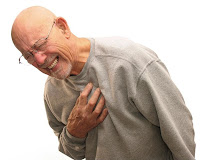 When a heart attack occurs there are two types of occurrences. The first is a sudden painful and profound feeling in your chest. The other more common type of heart attacks is the kind that starts gradually with mild discomfort and pain. Often time’s people who are suffering from this type of heart attack are not sure what is happening and wait too long before getting help. Below are some warning signs that a heart attack is occurring:
When a heart attack occurs there are two types of occurrences. The first is a sudden painful and profound feeling in your chest. The other more common type of heart attacks is the kind that starts gradually with mild discomfort and pain. Often time’s people who are suffering from this type of heart attack are not sure what is happening and wait too long before getting help. Below are some warning signs that a heart attack is occurring:Chest discomfort.
Chest discomfort is the most common symptom of a heart attack. The discomfort often is centered in the middle of the chest and will last a few minutes. This feeling will often last the entirety of the heart attack or will dissipated and return moments later. The chest discomfort will have feel of uncomfortable pressure, fullness, squeezing or pain.
Discomfort in the upper body.
Symptoms can also include a painful felling in your arms, neckline, jaw, back, or stomach.
Shortness of breath
Another warning sign to a heart attack maybe a shortness of breath. This shortness of breath can be accompanied by chest discomfort.
Other signs of a heart attack may include a cold sweat, vomiting, dizziness or a headache.
When a heart attack occurs every minute counts! The difference between life and death can be five minutes. If you are unsure of a heart attack consult with your doctor, or call 911
Dialing 9-1-1 is the fastest way to receive lifesaving treatment. Paramedics can arrive up to an hour faster than driving to a hospital by a loved one. Not only can paramedics arrive faster, they can provide lifesaving treatment in case of emergency.
In any case, if you are having more than one symptom of a heart attack do not attempt to drive to the hospital alone unless it is your absolute last option.
More Information about Heart Attack and Stroke Screenings




